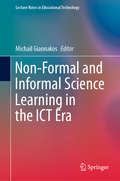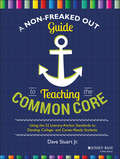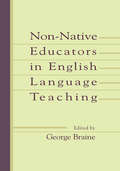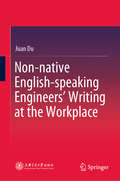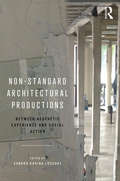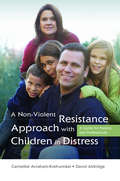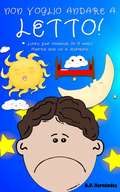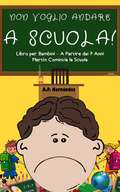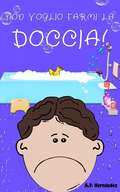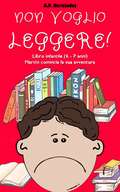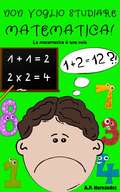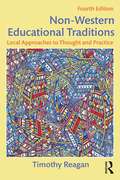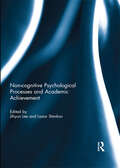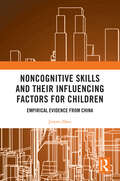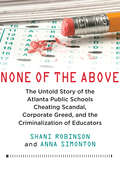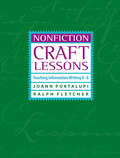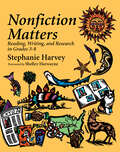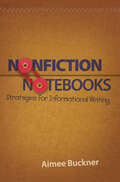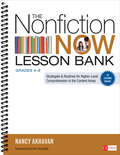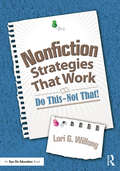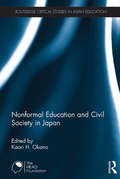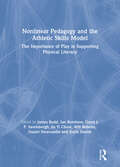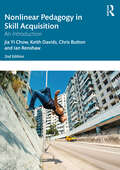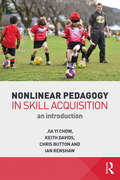- Table View
- List View
Non-Formal and Informal Science Learning in the ICT Era (Lecture Notes in Educational Technology)
by Michail GiannakosThis book introduces the reader to evidence-based non-formal and informal science learning considerations (including technological and pedagogical innovations) that have emerged in and empowered the information and communications technology (ICT) era. The contributions come from diverse countries and contexts (such as hackerspaces, museums, makerspaces, after-school activities) to support a wide range of educators, practitioners, and researchers (such as K-12 teachers, learning scientists, museum curators, librarians, parents, hobbyists). The documented considerations, lessons learned, and concepts have been extracted using diverse methods, ranging from experience reports and conceptual methods to quantitative studies and field observation using qualitative methods. This volume attempts to support the preparation, set-up, implementation, but also evaluation of informal learning activities to enhance science education.
A Non-Freaked Out Guide to Teaching the Common Core
by Dave Stuart Jr.Implement the Common Core for ELA without all the stress A Non-Freaked Out Guide to Teaching the Common Core uses the often-neglected anchor standards to get to the heart of the Common Core State Standards (CCSS)--teaching students the skills they need to be college and career ready. Each anchor standard is broken down into its key points, and a discussion of each anchor standard's central purpose helps outline the context for each required skill. This easy-to-read guide gives educators the kind of clear explanations, examples, and strategies they need to feel comfortable teaching the CCSS, and shows how CCSS skills can be integrated into virtually any existing lesson plan. Getting a firm grasp of the anchor standards is the quickest way to start teaching the key concepts of the CCSS, and this user-friendly guide is designed to pave the way for both the first-time teacher and the experienced pro.
Non-native Educators in English Language Teaching
by George BraineThe place of native and non-native speakers in the role of English teachers has probably been an issue ever since English was taught internationally. Although ESL and EFL literature is awash, in fact dependent upon, the scrutiny of non-native learners, interest in non-native academics and teachers is fairly new. Until recently, the voices of non-native speakers articulating their own concerns have been even rarer. This book is a response to this notable vacuum in the ELT literature, providing a forum for language educators from diverse geographical origins and language backgrounds. In addition to presenting autobiographical narratives, these authors argue sociopolitical issues and discuss implications for teacher education, all relating to the theme of non-native educators in ETL. All of the authors are non-native speakers of English. Some are long established professionals, whereas others are more recent initiates to the field. All but one received part of the higher education in North America, and all except two of the chapters are at least partially contextualized in North America. Particularly relevant for non-native speakers who aspire to enter the profession, graduate students in TESOL programs, and teacher educators, the unique nature of this book's contributors and its contents will interest researchers and professionals in applied linguistics generally and in ELT, and all those who are concerned with the role of non-native speakers in English-language teaching.
Non-native English-speaking Engineers’ Writing at the Workplace
by Juan DuBased on 55 semi-structured in-depth interviews, this book investigates 15 high-tech engineering co-op professionals’ writing experience in the workplace. It shows how the digital age has had a marked impact on the engineers’ methods of communication at work, and how on-the -job writing has affected engineers’ technical competence, shaped their professional identities, challenged their views on Chinese and English writing, and hindered their success in the workplace. The book identifies three aspects of writing practice: engineers’ linguistic and literacy challenges, the reasons behind these challenges, and coping strategies, which suggest that engineers are underprepared and lack necessary support in the workplace. Lastly, the study shows that engineers need to engage in technical literacy through on-the-job writing so that they can fully deal with workplace discourse and socialize with diverse professional groups.Since the sample group interviewed in this book is engineers who studied at universities in the United States and have a foot in the world of school and work as well as knowledge of both Eastern and Western cultures, the book appeals to teachers, students, engineers and scientists who are interested in scientific and technological writing. It is also valuable for educators who prepare scientists, engineers, and technical communicators for professional roles, as well as for communication practitioners who work with engineers.
Non-Standard Architectural Productions: Between Aesthetic Experience and Social Action
by Sandra Karina LöschkeThis book captures concepts and projects that reshape the discipline of architecture by prioritizing people over buildings. In doing so, it uncovers sophisticated approaches that go beyond standard architectural protocols to explore experience-based aesthetics, encounters, action-based research, critical practices, and social engagement. If these are widely understood as singular or incompatible approaches, the book reveals that they form a growing network of interrelations and generate levels of flexibility and dynamism that are reshaping the discipline. The thirteen chapters analyze thought-provoking projects – branded museums, restaged exhibitions, home/work spaces, multi-cultural spaces, ageing apartment blocks, abandoned homes, and urban slums amongst them. Together, they enliven the stalled debate about a single architectural response to the complex challenges of the contemporary world by highlighting pluralistic perspectives on architecture that offer fresh solutions on how architecture can improve people’s lives. Featuring essays from an international range of authors, this book makes a vital contribution to our understanding of the wider conditions under which, and in relation to which, contemporary architecture is produced.
A Non-Violent Resistance Approach with Children in Distress
by David Aldridge Carmelite Avraham-KrehwinkelParents, teachers and other professionals often struggle to know how to deal with disruptive, abusive or aggressive behaviour. This book addresses the urgent need for a realistic, practical and effective approach to dealing with severe disruptive behaviour in children and adolescents. Adapting the principles of non-violent resistance originally advocated by Mahatma Gandhi, the book provides de-escalation techniques which empower the adult and unburden the distressed child. The authors outline the theoretical basis upon which the approach was developed, and explain how and why it can be so effective. Case studies demonstrate how the approach can be used to reach more successful places with unhappy and disruptive children of different ages. A separate section for parents provides useful advice on how to take the theoretical material and use it to deal with problematic behaviour in everyday life. As effective as it is original, this approach will empower desperate parents and despairing caregivers by equipping them with hands-on tools to contain, counter and positively direct the aggression and opposition which they face from children in distress.
Non Voglio Andare a Letto!: Libro per bambini (6-9 anni). Martin non va a dormire.
by A. P. HernándezMartín ha otto anni e ha preso una decisione. Ha le idee chiare. Oggi non va a dormire! E certo che ci riesce! Ma il giorno dopo iniziano a succedergli cose molto strane. Scoprile! Un libro per bambini raccomandato per bimbi da 6 a 9 anni. Lo scopo di questo libro per bambini è rivendicare il sonno come elemento riparatore. Attraverso le avventure di Martin, i bambini impareranno quanto sia importante dormire per avere un rendimento migliore a scuola e vivere meglio. Non voglio andare a letto! è un libro di primi insegnamenti, adatto per essere letto ad alta voce ai più piccoli. È anche utile per le prime letture in autonomia dei bambini e delle bambine.
Non Voglio Andare a Scuola! Libro per Bambini – A Partire dai 7 Anni. Martín Comincia la Scuola
by A. P. HernándezMartin inizia la scuola, ma non vuole andarci. Preferisce restare nella sua casa a giocare con i suoi videogiochi, con i suoi peluche e il suo elicottero telecomandato. Dopotutto, Martín sa molte cose: sa contare da uno a dieci e sa anche che, se sommi ad un videogioco un altro videogioco, il risultato sono due videogiochi. Quindi, perché dovrebbe andare a scuola? Martín si rifiuta di alzarsi il primo giorno di scuola. Si aggrappa alla testiera del letto con tutte le sue forze e sua madre non riesce a farlo alzare, quindi ... Martín ottiene ciò che vuole! Riesce a rimanere da solo a casa tutta la mattina! Ma le cose non sono così divertenti come pensava ... Un libro per bambini consigliato dai 6-7 anni. Lo scopo di questo libro per bambini è stimolare l'immaginazione nelle bambine e nei bambini e facilitare la riflessione sull'importanza di andare a scuola. Con le avventure di Martín, i bambini e le bambine impareranno a valorizzare la scuola come pilastro fondamentale nel loro apprendimento e nel loro sviluppo personale e sociale. Non voglio andare a scuola! è un libro di primi insegnamenti da leggere ad alta voce ai più piccoli. È anche utile per i bambini e le bambine che intraprendono l’avventura della lettura in autonomia.
Non voglio farmi la doccia!: Libri per bambini. Lettura dai 6-7 anni. (Non voglio...! #4)
by A. P. HernándezDi cosa parla questo libro? Farsi la doccia è una vera scocciatura. Martin ha scoperto che per farsi una doccia deve fare un mucchio di cose e che comporta un gran lavoro. Quindi Martin prende una decisione: non farà mai più la doccia! Perché leggere questo libro? Perché, attraverso le avventure di Martin, i bambini e le bambine rifletteranno sull'importanza di lavarsi tutti i giorni, imparando che la buona igiene è essenziale per la salute. Chi può leggere questo libro? Questo libro, per la sua corta estensione e il suo vocabolario semplice, è raccomandato per bambini dai 6-7 anni. Contiene anche illustrazioni che renderanno la sua lettura più piacevole.
Non voglio leggere! Libro infantile (6 - 7 anni). Martín comincia la sua avventura
by A. P. HernándezUn libro per un primo approccio alla lettura, adatto anche alla lettura ai più piccoli. Utile anche come prima lettura per bambini e bambine. Martín ha otto anni e detesta leggere. La scuola è appena finita e a Martín lo aspettano lunghe vacanze estive. Purtroppo però, Josefina, la sua maestra, gli ha assegnato un mucchio di compiti e schede da ripassare. Ma la cosa peggiore non sono le addizioni, né le tavole con le moltiplicazioni, né tantomeno le copie… Josefina gli ha assegnato un libro da leggere! Un libro senza disegni, pieno zeppo di parole! Una mattina, in un eroico atto di coraggio, Martín comincia a leggere il libro. E nel farlo, gli succede qualcosa di straordinario… Un libro infantile raccomandato a bambini a partire dai 6-7 anni. La finalità di questo libro infantile è quella di fomentare l’immaginazione in bambini e bambine e risvegliare la loro curiosità per la letteratura, aiutandoli a scoprire che, tra le pagine di un libro, possono vivere avventure e nuovi mondi.
Non voglio studiare matematica!: Libro per bambini da 6-7 anni. La matematica è una noia. (Non voglio...! #7)
by A. P. HernándezMartin ha otto anni e odia la matematica. D'ora in poi, non studierà mai più matematica, quindi niente più addizioni, sottrazioni, problemi e tutto il resto. Martin è convinto che la matematica non serve a niente, e poi è una noia. Però, la sua vita cambierà completamente. Un libro per bambini raccomandato a partire dai 6-7 anni. Lo scopo di questo libro per bambini è rivendicare la presenza della matematica nella nostra vita quotidiana. Con le avventure di Martin, le bambine e i bambini capiranno che con la matematica possono essere spiegate e risolte molte situazioni quotidiane. Non voglio studiare matematica! È un libro di primi insegnamenti. È il settimo libro della collana di libri per bambini “Non voglio...!” Altri titoli sono: Altri titoli di questa collana per bambini sono: 1. Non voglio leggere! 2. Non voglio andare a scuola! 3. Non voglio andare a letto! 4. Non voglio farmi la doccia! 5. Non voglio lavarmi i denti! 6. Non voglio stare senza cellulare!
Non-Western Educational Traditions: Local Approaches to Thought and Practice
by Timothy ReaganInformative and mind-opening, this text uniquely provides a comprehensive overview of a range of non-western approaches to educational thought and practice. Its premise is that understanding the ways that other people educate their children—as well as what counts for them as "education"—may help readers to think more clearly about some of their own assumptions and values, and to become more open to alternative viewpoints about important educational matters. The approach is deliberately and profoundly pedagogical, based in the author’s own teaching practice. Designed to be used in pre-service and in-service teacher education courses where substantial critical discussion and debate are encouraged, the text is enhanced by Questions for Discussion and Reflection in each chapter. Updates and Features of the Fourth Edition • NEW! Chapter 2 exploring key features of the ‘western educational tradition’, and information about the contemporary educational systems in different countries • NEW! Chapter 10 on traditional educational thought and practice in Oceania, with special focus on the Maori in New Zealand, the Hawai’ians, and the Australian Aboriginal peoples • Updated chapter on Africa includes fuller explanation of the diversity within the indigenous African experience, as well as several contemporary cases of state education in Africa • Updated Chapter 4 is designed to help non-Muslims to understand the Muslim educational heritage and the growing issue of Islamophobia • Exploration of Chinese education now includes a special emphasis on the thought of Confucius, the role of the imperial examination system, and the impact of political and economic changes in the 20th century • Updated analysis of contemporary educational practices in Hindu and Buddhist educational thought and practice and brief discussions of Jainism and Sikhism
Noncognitive psychological processes and academic achievement
by Jihyun Lee and Lazar StankovIt is becoming increasingly clear that non-cognitive psychological processes are important for students’ school achievement, even to the point where their influence may be stronger than that exerted by the parents, teachers, or the school atmosphere itself. Non-cognitive psychological variables refer to varieties of self-beliefs and goal orientations – such as anxiety, confidence, self-efficacy, and self-concept – which are often seen as dispositional and motivational in nature. It is particularly important to highlight the role that confidence and self-efficacy play in school achievement, as these two self-beliefs are related to metacognitive processing – the awareness of what you know and what you do not know. Self-concept, meanwhile, tends to exert its influence on an individual’s choice of tertiary level courses. This book suggests that by focusing on students’ self-beliefs, the education system may be in a position to improve cognitive performance, since individual students’ self-beliefs may be more malleable than the cognitive processes involved in acquiring academic knowledge. Focusing on these non-cognitive psychological processes is also likely to be more effective in improving performance than system-wide interventions involving changes in policy for both public and private sector educators. This book will be useful to educational researchers, school leaders, administrators, counsellors, and teachers, in guiding students’ attitudes towards learning and school performance. It will also provide students in psychology and education with broad and nuanced insights into the drivers of school achievement. This book was originally published as a special issue of Educational Psychology.
Noncognitive Skills and Their Influencing Factors for Children: Empirical Evidence from China
by Jinyan Zhou"Non-cognitive skills" cover any skills that are not cognitive, such as conscientiousness, perseverance, and teamwork, which are critically important in education. However, for many years, “non-cognitive skills" have always been ignored in human capital theory. The book, using a multidisciplinary approach, tries to uncover the noncognitive components of human capital, so as to answer the question “what is the skill that should be invested". The author expands the connotations of human capital by exploring the value of noncognitive skills and their production patterns, constructing a measurement framework and a set of tools to measure noncognitive skills. She especially carries out an empirical survey which covers primary and secondary school students from seven provinces of China's East, Middle, and West areas. With the data collected, she analyzes Chinese students' noncognitive development and further identifies the critical factors that may impact their noncognitive skills by applying the Bayesian Model Average approach. The book will be a theoretical contribution to education economics. Researchers interested in education in China, children’s development and policymakers in the field of education will find this book helpful and resourceful.
None of the Above: The Untold Story of the Atlanta Public Schools Cheating Scandal, Corporate Greed , and the Criminalization of Educators
by Shani Robinson Anna SimontonAn insider's account of the infamous Atlanta Public Schools cheating scandal that scapegoated black employees for problems rooted in the education reform movement.In March of 2013, 35 educators in the Atlanta Public Schools were charged with racketeering and conspiracy--the same charges used to bring down the American mafia--for allegedly changing students' answers on standardized tests. All but one was black. The youngest of the accused, Shani Robinson, had taught for only 3 years and was a new mother when she was wrongfully convicted and faced up to 25 years in prison. She and her coauthor, journalist Anna Simonton, look back to show how black children in Atlanta were being deprived long before some teachers allegedly changed the answers on their students' tests.Stretching all the way back to Brown v. Board of Education, the landmark 1954 Supreme Court ruling that outlawed segregation in public schools, to examining the corporate-led education reform movement, the policing of black and brown citizens, and widening racial and economic disparities in Atlanta, Robinson and Simonton reveal how real estate moguls and financiers were lining their pockets with the education dollars that should have been going to the classroom.
Nonfiction Craft Lessons: Teaching Information Writing K-8
by JoAnn Portalupi Ralph FletcherWriting nonfiction represents a big step for most students, yet when they try to create a report or persuasive essay, they are often anxious and frustrated. JoAnn Portalupi and Ralph Fletcher created Nonfiction Craft Lessons: Teaching Information Writing, K-8 to help teachers bring the passion from student writing while helping students scaffold their ideas in this challenging genre. The authors divided this book into grade-specific sections for K-2, 3-4, and middle school (grades 5-8) students. These divisions reflect various differences between emerging, competent, and fluent writers. In each section you'll find a generous collection of craft lessons directed at the genre that's most appropriate for that particular age. In the K-2 section, for example, a number of craft lessons focus on the all-about or concept book. In the 3-4 section there are several lessons on biography. In the 5-8 section a series of lessons addresses expository writing. Throughout the book each of the 80 lessons is presented on a single page in an easy-to-read format. Every lesson features three teaching guidelines: Discussion --A brief look at the reasons for teaching the particular element of craft specifically in a nonfiction context. How to Teach It --Concrete language showing exactly how a teacher might bring this craft element to students in writing conferences or a small-group setting. Resource Material --Specific book or text referred to in the craft lesson including trade books, or a piece of student writing in the Appendixes. This book will help students breathe voice into lifeless "dump-truck" writing and improve their nonfiction writing by making it clearer, more authoritative, and more organized. Nonfiction Craft Lessons gives teachers a wealth of practical strategies to help students grow into strong writers as they explore and explain the world around them.
Nonfiction Matters: Reading, Writing, and Research in Grades 3-8
by Stephanie HarveyWhen we open the gates to nonfiction inquiry, we open our thinking and expect the unexpected, making reading discoveries, research discoveries, and writing discoveries on our way. Nonfiction Matters offers teachers the tools to help students explore nonfiction and dig deep to reach more complete understanding of the real world and report these insights in a compelling manner. Stephanie Harvey shows how students can read expository text, engage in research, and write authentic nonfiction that is captivating, visual, and full of voice. The inquiry projects she describes require in-depth learning: topic selection, question development, research exploration, reading for content, organization, synthesis, writing to convey meaning, and presenting findings—all skills that develop independent thinkers who know how to make decisions, solve problems, and apply their knowledge insightfully. Full of practical suggestions to help you bring nonfiction into your curriculum, Nonfiction Matters: presents strategies for understanding expository text and conducting meaningful research;offers ideas for organizing and writing accurate, effective nonfiction from idea to finished presentation;advances the importance of teacher modeling and guided practice in instructional delivery;provides a list of inquiry tools and resources—both print and electronic;suggests ways to facilitate project-based learning and assess the projects as they develop;includes bibliographies of nonfiction children's books by subject and genre and lists of recommended magazines.Why is nonfiction almost a guaranteed success? The key to teaching with nonfiction is passion, for children are passionate inquirers, and nonfiction fuels their curiosity and their demand for knowledge and understanding of the world.
Nonfiction Notebooks: Strategies for Informational Writing
by Aimee BucknerIn my classroom, I have found that through the support of notebook work, students can grow their writing and strengthen their ideas. With strong ideas, they can write better first drafts. The work we do in notebooks before rushing into a draft gives us time to envision our work, to find mentor texts we love, and to study those texts. In doing so, we actually are doing a lot of the revision- on our vision- before we write the draft. -; Nonfiction Notebooks Aimee Buckner has introduced writer's notebooks to hundreds of classrooms through her popular book Notebook Know-How , thereby helping students everywhere learn to improve their overallwriting by focusing on essential prewriting strategies. Now, using the same format, Aimee explains how writer's notebooks can help students improve their nonfiction writing-;reports, articles, memoirs, essays, and so forth-;which has taken on even greater importance because of the emphasis the Common Core State Standards place on informative/explanatory writing. As Aimee explains, the prewriting work a student does is particularly important when writing informational pieces. Writer's notebooks help students capture their thoughts, develop ideas, explore mentor texts, refine a research strategy, and play with multiple outcomes-;all of which lead to stronger concepts and better first drafts. Greater emphasis on the front end of the writing process also saves time and energy at the revision and editing stages. From exploring topics to gathering information to assessment, Nonfiction Notebooks takes teachers step-by-step through the process of how best to use notebooks for informational writing. Helpful reproducible forms are included both in the book and as downloads online.
The Nonfiction Now Lesson Bank, Grades 4-8: Strategies and Routines for Higher-Level Comprehension in the Content Areas
by Nancy L. AkhavanWhat exactly makes The Nonfiction NOW Lesson Bank such a stand-out? If you consider the amount of instructional support, that alone is substantial enough to transform your teaching. But Nancy Akhavan happens to be an educator who has performed many roles over her career so she divests in this book just about everything in her professional vault A whole new vision of teaching nonfiction 50 powerhouse lessons A bank of short informational texts Dozens of student practice activities Graphic organizers for taming textbooks Unlike so many books, this one will live its life in actual use: dog-eared, sticky-noted, and loved.
Nonfiction Strategies That Work: Do This--Not That!
by Lori G. WilfongTeachers are being bombarded with ideas for teaching nonfiction, but what really works? In this essential book, dynamic author Lori G. Wilfong describes ten best practices for teaching nonfiction and how to implement them in the classroom. She also points out practices that should be avoided, helping you figure out which strategies to ditch and which to embrace. Topics covered include… Finding quality, differentiated texts to teach content Selecting support strategies with purpose Providing students with a range of scaffolds for effective summary writing Purposely selecting vocabulary words to support content learning Working with students to develop strategies to cite textual evidence Using text structure as both a reading and writing tool for analyzing nonfiction And much more! Every chapter begins with an engaging scenario and ends with action steps to help you get started. The book also contains tons of handy templates that you can reproduce and use in your own classroom.
Nonformal Education and Civil Society in Japan (Routledge Critical Studies in Asian Education)
by Kaori H. OkanoNonformal Education and Civil Society in Japan critically examines an aspect of education that has received little attention to date: intentional teaching and learning activities that occur outside formal schooling. <P><P>In the last two decades nonformal education has rapidly increased in extent and significance. This is because individual needs for education have become so diverse and rapidly changing that formal education alone is unable to satisfy them. Increasingly diverse demands on education resulted from a combination of transnational migration, heightened human rights awareness, the aging population, and competition in the globalised labour market. Some in the private sector saw this situation as a business opportunity. Others in the civil society volunteered to assist the vulnerable. The rise in nonformal education has also been facilitated by national policy developments since the 1990s. <P><P>Drawing on case studies, this book illuminates a diverse range of nonformal education activities; and suggests that the nature of the relationship between nonformal education and mainstream schooling has changed. Not only have the two sectors become more interdependent, but the formal education sector increasingly acknowledges nonformal education’s important and necessary roles. These changes signal a significant departure from the past in the overall functioning of Japanese education. The case studies include: neighbourhood homework clubs for migrant children, community-based literacy classes, after-school care programs, sport clubs, alternative schools for long-term absent students, schools for foreigners, training in intercultural competence at universities and corporations, kôminkan (community halls), and lifelong learning for the seniors. This book will appeal to both scholars of Japanese Studies/Asian Studies, and those of comparative education and sociology/anthropology of education.
Nonlinear Pedagogy and the Athletic Skills Model: The Importance of Play in Supporting Physical Literacy
by Ian Renshaw Keith Davids Daniel Newcombe Will Roberts Jia Yi Chow Geert Savelsbergh James RuddThis book offers an ecological conceptualisation of physical literacy. Re-embracing our ancestry as hunter gatherers we gain a new appreciation and understanding of the importance of play, not only in terms of how children learn, but also in showing us as educators how we can lay the foundations for lifelong physical activity. The concept of physical literacy has been recognised and understood throughout history by different communities across the globe. Today, as governments grapple with the multiple challenges of urban life in the 21st century, we can learn from our forebears how to put play at the centre of children’s learning in order to build a more enduring physically active society. This book examines contemporary pedagogical approaches, such as constraints-led teaching, nonlinear pedagogy and the athletic skills model, which are underpinned by the theoretical framework of Ecological Dynamics. It is suggested that through careful design, these models, aimed at children, as well as young athletes, can (i) encourage play and facilitate physical activity and motor learning in children of different ages, providing them with the foundational skills needed for leading active lives; and (ii), develop young athletes in elite sports programmes in an ethical, enriching and supportive manner. Through this text, scientists, academics and practitioners in the sub-disciplines of motor learning and motor development, physical education, sports pedagogy and physical activity and exercise domains will better understand how to design programmes that encourage play and thereby develop the movement skills, self-regulating capacities, motivation and proficiency of people, so that they can move skilfully, effectively and efficiently while negotiating changes throughout the human lifespan.
Nonlinear Pedagogy and the Athletic Skills Model: The Importance of Play in Supporting Physical Literacy
by James Rudd Ian Renshaw Geert Savelsbergh Jia Yi Chow Will Roberts Daniel Newcombe Keith DavidsThis book offers an ecological conceptualisation of physical literacy. Re-embracing our ancestry as hunter gatherers we gain a new appreciation and understanding of the importance of play, not only in terms of how children learn, but also in showing us as educators how we can lay the foundations for lifelong physical activity. The concept of physical literacy has been recognised and understood throughout history by different communities across the globe. Today, as governments grapple with the multiple challenges of urban life in the 21st century, we can learn from our forebears how to put play at the centre of children’s learning in order to build a more enduring physically active society. This book examines contemporary pedagogical approaches, such as constraints-led teaching, nonlinear pedagogy and the athletic skills model, which are underpinned by the theoretical framework of Ecological Dynamics. It is suggested that through careful design, these models, aimed at children, as well as young athletes, can (i) encourage play and facilitate physical activity and motor learning in children of different ages, providing them with the foundational skills needed for leading active lives; and (ii), develop young athletes in elite sports programmes in an ethical, enriching and supportive manner. Through this text, scientists, academics and practitioners in the sub-disciplines of motor learning and motor development, physical education, sports pedagogy and physical activity and exercise domains will better understand how to design programmes that encourage play and thereby develop the movement skills, self-regulating capacities, motivation and proficiency of people, so that they can move skilfully, effectively and efficiently while negotiating changes throughout the human lifespan.
Nonlinear Pedagogy in Skill Acquisition: An Introduction
by Jia Yi Chow Keith Davids Chris Button Ian RenshawNonlinear Pedagogy is a powerful paradigm for understanding human movement and for designing effective teaching, coaching and training programmes in sport, exercise and physical education (PE). It addresses the inherent complexity in learning movement skills, viewing the learner, the learning environment and the teacher or coach as a complex interacting system. The constraints of individual practice tasks provide the platform for functional movement behaviours to emerge during practice and performance. The second edition includes new materials, of practical, theoretical and empirical relevance, to enhance understanding of how to implement a Nonlinear Pedagogy to support learning in sport, PE and physical activity. There is updated, in-depth discussion on the various pedagogical principles that support Nonlinear Pedagogy and how these principles are applicable in learning designs in sports and physical education. There is further emphasis on examining how transfer of learning is implicated in practice, highlighting its relevance on skill adaptation and talent development. The first part of the book updates the general theoretical framework to explain processes of skill acquisition and motor learning. This edition draws clearer links between skill acquisition, expertise and talent development, focusing on how specificity and generality of transfer have a role to play in the development of learners. The book defines Nonlinear Pedagogy and outlines its key principles of practice. It offers a thorough and critical appraisal of the functional use of instructional constraints and practice design. It discusses methods for creating challenging and supportive individualised learning environments at developmental, sub-elite and elite levels of performance. The second part focuses on the application of Nonlinear Pedagogy in sports and PE. There is a greater emphasis on helping applied scientists and practitioners understand the impact of Nonlinear Pedagogy on transfer of learning. Every chapter is updated to provide relevant contemporary cases and examples from sport and exercise contexts, providing guidance on practice activities and lessons. Nonlinear Pedagogy in Skill Acquisition is an essential companion for any degree-level course in skill acquisition, motor learning, sport science, sport pedagogy, sports coaching practice, or pedagogy or curriculum design in physical education.
Nonlinear Pedagogy in Skill Acquisition: An Introduction
by Ian Renshaw Keith Davids Jia Yi Chow Chris ButtonNonlinear pedagogy is a powerful paradigm for understanding human movement and for designing effective teaching, coaching and training programs in sport, exercise and physical education. It addresses the inherent complexity in the learning of movement skills, viewing the learner, the learning environment and the teacher or coach as a complex interacting system, with the constraints of individual practice tasks providing the platform for functional movement behaviours to emerge. This is the first book to explain this profoundly important new approach to skill acquisition, introducing key theoretical ideas and best practice for students, teachers and coaches. The first section of the book offers a general theoretical framework to explain processes of skill acquisition and the learning of movement skills. The book then defines nonlinear pedagogy, and outlines its key principles of practice. It offers a thorough and critical appraisal of the optimal use of instructional constraints and practice design, and discusses methods for creating challenging and supportive individualised learning environments at developmental, sub-elite and elite levels of performance. Every chapter contains cases and examples from sport and exercise contexts, providing guidance on practice activities and lessons. Nonlinear Pedagogy in Skill Acquisition is an essential companion for any degree level course in skill acquisition, motor learning, sport science, sport pedagogy, sports coaching practice, or pedagogy or curriculum design in physical education.
